英语翻译第七周作业
牛津译林版英语七年级下册6-8单元句子翻译练习

句子翻译专项训练(7B Units 6-8)编写:顾宇荣校对:李永清班级:_______ 姓名:___________ 学号:________1.我累了,请帮我拎包。
I ____________________________. Please _____________________________.2.你总是牢骚满腹,别就这事抱怨了。
You are always_______________________. Don’t _____________________this.3.她抬头看到了一只穿外套的白色兔子路过。
She_______________________________ a white rabbit __________________.4.她从口袋里拿出了一块手表,看了看时间。
She_______________________________her pocket and __________________.5.她站起身来,越过田野,追赶那只兔子。
She _________________and__________________________________the rabbit.6.她不想让兔子逃脱,所以也跳下了洞。
She__________________________________,so _______________________.7.她摔落了许久,然后跌在地上。
She ____________________________and then__________________________.8.她发现自己独自深处一个大厅中,四周都是门,但都锁着。
She __________________________________________________.There were _______________________, but they ________________________.9.她看到了桌上有把小钥匙,但是它打不开任何一扇门。
大学体验英语综合教程3课后习题六、七、八答案及翻译
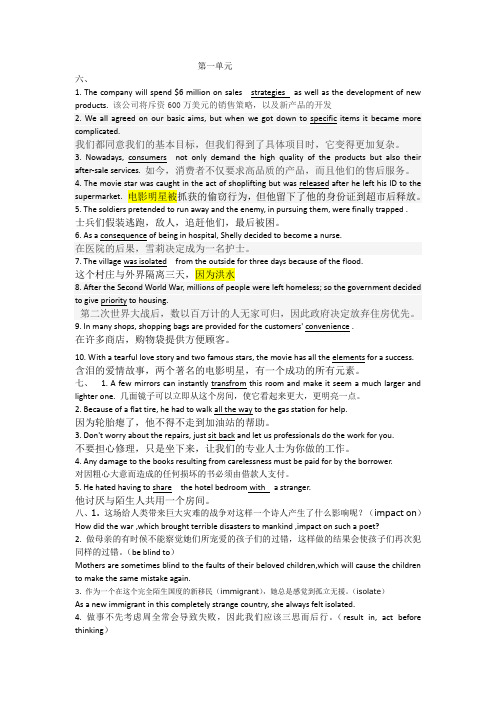
第一单元六、1. The company will spend $6 million on sales strategies as well as the development of new products.该公司将斥资600万美元的销售策略,以及新产品的开发2. We all agreed on our basic aims, but when we got down to specific items it became more complicated.我们都同意我们的基本目标,但我们得到了具体项目时,它变得更加复杂。
3. Nowadays, consumers not only demand the high quality of the products but also their after-sale services.如今,消费者不仅要求高品质的产品,而且他们的售后服务。
4. The movie star was caught in the act of shoplifting but was released after he left his ID to the supermarket.电影明星被抓获的偷窃行为,但他留下了他的身份证到超市后释放。
5. The soldiers pretended to run away and the enemy, in pursuing them, were finally trapped .士兵们假装逃跑,敌人,追赶他们,最后被困。
7. The village was isolated from the outside for three days because of the flood.这个村庄与外界隔离三天,因为洪水8. After the Second World War, millions of people were left homeless; so the government decided to give priority to housing.第二次世界大战后,数以百万计的人无家可归,因此政府决定放弃住房优先。
龙鹏学校四年级上学期英语第7周学案

龙鹏学校四年级上学期英语第七周学案班级:________ 姓名:________家长签名:________编辑:陈雄辉Unit 4 A school outing同学们,本单元我们将学习有关学校郊游的单词和句型:1.单词:beach, sunglasses, paper, camera, map, lunchbox, their, sandcastle2.句型: 1.Do you have sunglasses ?Yes , I do ./No, I don’t.2.Whose game is this ?It’his game .Whose lunchboxes are these ?They are their lunchbox .学习目标:1,以上单词和句型要求“四会”,会听,会说,会认读,会写.2,在郊游或其它活动时,会用英语表达物的主人。
Writing Section一.看看下面的词放哪儿合适呢?请帮他们找到正确的位置吗?me your they our you he it1.---Do you have_________ sunglasses, Tim? ---Yes, I do.2.---Can _____ help______. Tom ? ---Sure.3. This is our principle. _________ is going to give the prizes.4. That’s Jack’s dog. _________ is very lovely.5.---Whose cameras are these ? -- _________ are ________ cameras.二.翻译词组1.造沙堡_____________2.一次学校郊游___________3.谁的太阳镜_____________4.我们的照相机____________5.我的纸________________6.你的午餐盒____________7.他的地图______________8.去海滩________________ 三.请选择正确的答案。
人教版英语七年级上册周周练—第七周
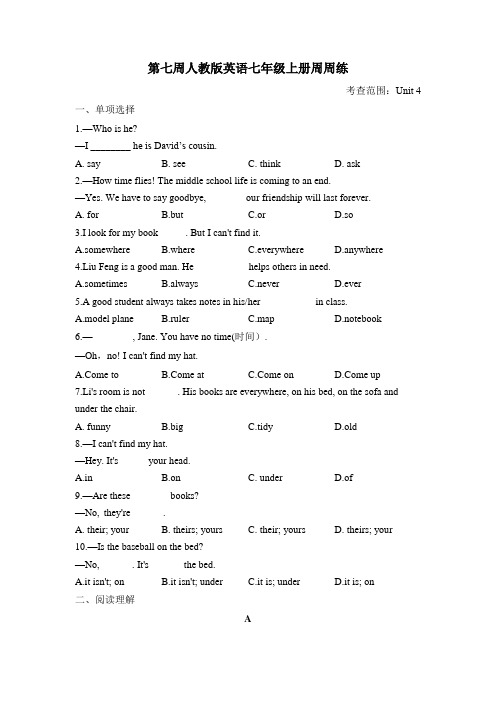
第七周人教版英语七年级上册周周练考查范围:Unit 4一、单项选择1.—Who is he?—I ________ he is David’s cousin.A. sayB. seeC. thinkD. ask2.—How time flies! The middle school life is coming to an end.—Yes. We have to say goodbye, _______ our friendship will last forever.A. forB.butC.orD.so3.I look for my book _____. But I can't find it.A.somewhereB.whereC.everywhereD.anywhere4.Liu Feng is a good man. He __________ helps others in need.A.sometimesB.alwaysC.neverD.ever5.A good student always takes notes in his/her __________ in class.A.model planeB.rulerC.mapD.notebook6.—________, Jane. You have no time(时间).—Oh,no! I can't find my hat.e toe ate one up7.Li's room is not ______. His books are everywhere, on his bed, on the sofa and under the chair.A. funnyB.bigC.tidyD.old8.—I can't find my hat.—Hey. It's _____ your head.A.inB.onC. underD.of9.—Are these _______ books?—No, they're ______.A. their; yourB. theirs; yoursC. their; yoursD. theirs; your10.—Is the baseball on the bed?—No, ______. It's ______ the bed.A.it isn't; onB.it isn't; underC.it is; underD.it is; on二、阅读理解AThis is our classroom. It’s not big. There is a blue desk in the front(在前面). It’s our teacher’s desk. On the teacher’s desk, there is a computer. There are twenty green desks and chairs, too. They are ours. On the wall there is a blackboard. What colour is it? Of course it’s black . There are six pictures on the wall, too. They are red. There is a ball under my desk. It’s black and white. It’s my football. Football is my favourite sport. I like playing football with my friends.1.What’s on the teacher’s desk?A.A book.B.A pen.C.A computer.2.How many desks are there in the classroom?A.Twenty.B.Twenty-one.C.Twenty-three.3.What colour are the students’ chairs?A.Red.B.Green.C.White.4.Where is the writer’s(作者的)football?A.Under his desk.B.Under his chair.C.In his desk.5.What’s the writer’s favourite sport?A.Basketball.B.Running.C.Football.BHello, my name is Julia. I am a Chinese girl. Now I am in Class One? Grade Seven in No. 2 Middle School. I have a nice room. In my room, I have a bed, a desk, a bookcase, some chairs and some other things. I always put my books in my bookcase and on the desk. Where are my tennis balls? Oh, they are under the bed. But my basketball is under my chair. My parents love me very much. Their room is next to mine.1. What class is Julia in?A. Class One.B. Class Two.C. Class Seven.D. Class Six2. Does Julia have a desk in her room?A. No, she doesn't.B. Yes, she does.C. We don't know.D. No, she does.3. Where is her basketball?A. It's under her bed.B. It's under her chair.C. It's in the bookcase.D. It's on her chair.4. What does the underlined word "put" mean in Chinese?A.放置B.朗读C.扔D.推迟5. Next to Julia's room is _______.A. her sister's roomB. her brother's roomC. her parents' roomD. her grandparents' room三、补全对话A: Hello, Susan!B: ① ______A: Is my computer game on the table?B: No, it isn't. It's in the bookcase.A: Oh, OK, ②______ Are they in the bookcase, too?B: Let me have a look. ③______ They're on the chair.A: So, where is my pencil case?B: ④______A: Where's my backpack?B: It's under the table. And your baseball is under the chair.A: Good. ⑤______B: The keys? They're on the table.1.People like to put their books in the _______(书橱).2.Her books are _______ (到处).3.I love my room and it is always t_______ (井井有条的). 4—Where are my books?—They're on the _______ (沙发).5.—Is this Anna's tape ______ (播放机)?—No, it isn't. It's Sally's.五、书面表达假如你是李明,请根据下列信息写一篇短文介绍一下你自己。
六年级英语第七周周末作业
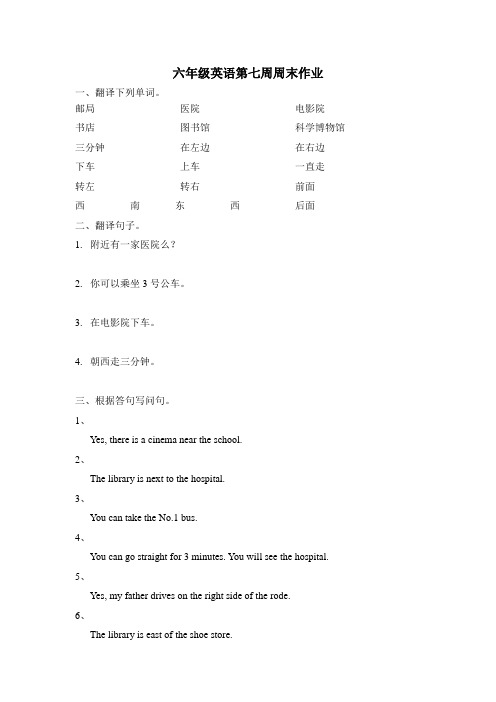
六年级英语第七周周末作业一、翻译下列单词。
邮局______________ 医院_______________ 电影院_______________ 书店______________ 图书馆_______________ 科学博物馆_______________ 三分钟_____________ 在左边_______________ 在右边_______________ 下车______________ 上车_______________ 一直走_______________ 转左______________ 转右_______________ 前面_______________ 西________ 南_______东________ 西________ 后面_______________二、翻译句子。
1.附近有一家医院么?________________________________________________________________ 2.你可以乘坐3号公车。
________________________________________________________________ 3.在电影院下车。
________________________________________________________________ 4.朝西走三分钟。
________________________________________________________________三、根据答句写问句。
1、________________________________________________________________Yes, there is a cinema near the school.2、________________________________________________________________The library is next to the hospital.3、________________________________________________________________You can take the No.1 bus.4、________________________________________________________________You can go straight for 3 minutes. You will see the hospital.5、________________________________________________________________Yes, my father drives on the right side of the rode.6、________________________________________________________________The library is east of the shoe store.三、单选题。
新视野大学英语book2-unit7翻译

新视野大学英语B o o k2-U n i t7翻译(共2页)--本页仅作为文档封面,使用时请直接删除即可----内页可以根据需求调整合适字体及大小--Unit7, Book 2Optional Listening 1Mark: I participated in the Nebuta Festival last August. It was a lot of fun! First, I went to a local shop to rent a haneto--- that’s the costume you wear. It’s easy …..anyone can do it and anyone can dance in the festival. The parade is loud and beautiful. People beat drums and dance around. The only bad part was when I injured my ankle from too much dancing! At night, after the parade, we watched some beautiful floats go down the river.Marissa: I spent two months traveling through India with my best friend. One of my best memories is the Holi Festival. WE went to a local store and bought some colored powder. Then we mixed it with water. On the day of the festival, someone gave me a water pistol. I filled it with my colored water and started shooting everyone. I even sprayed a police officer! What a mess! It took a long time before the color came out of my skin.背景知识:Nebuta Festival: 睡魔节于8月2日到7日在位于日本主岛本州北端的青森市举行。
【配套K12】三年级英汉笔译(一)学生用书
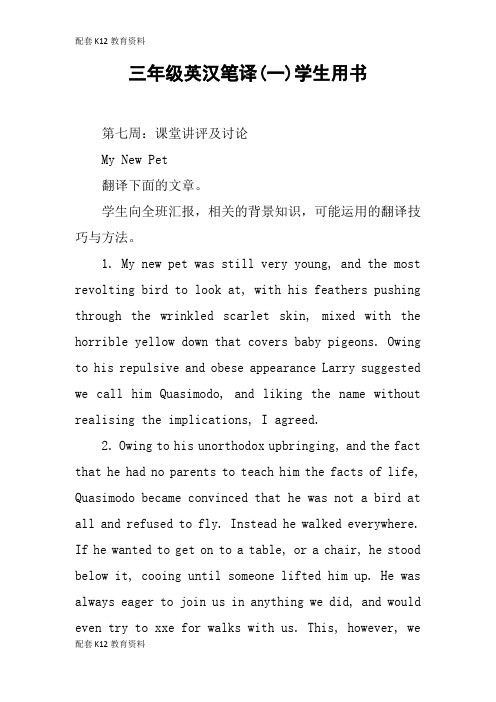
三年级英汉笔译(一)学生用书第七周:课堂讲评及讨论My New Pet翻译下面的文章。
学生向全班汇报,相关的背景知识,可能运用的翻译技巧与方法。
1. My new pet was still very young, and the most revolting bird to look at, with his feathers pushing through the wrinkled scarlet skin, mixed with the horrible yellow down that covers baby pigeons. Owing to his repulsive and obese appearance Larry suggested we call him Quasimodo, and liking the name without realising the implications, I agreed.2. Owing to his unorthodox upbringing, and the fact that he had no parents to teach him the facts of life, Quasimodo became convinced that he was not a bird at all and refused to fly. Instead he walked everywhere. If he wanted to get on to a table, or a chair, he stood below it, cooing until someone lifted him up. He was always eager to join us in anything we did, and would even try to xxe for walks with us. This, however, wehad to stop, for either you carried him on your shoulder, which was risking an accident to your clothes, or else you let him walk behind. Then you had to slow down your pace to suit his for should you get too far ahead you would hear the most frantic and imploring coos and turn round to find Quasimodo running desperately after you, indignant at your cruelty.3. Quasimodo insisted on sleeping in the house: nothing could get him to sleep in the pigeon-loft I had made for him. He preferred to sleep on the end of Margo ‘s bed. Eventually, however, he was banished to the drawing-room, for if Margo turned over in the night Quasimodo would wake, hobble up the bed and perch on her face, cooing loudly and lovingly.4. It was Larry who discovered that Quasimodo wasa musical pigeon. Not onlydid he like music, but he actually seemed to recognise two different varieties, the waltz and the military march. For ordinary music he would get as close to the gramophone as possible and sit there with eyes half-closed, purring softly. But if the music was a waltz he would move round and round the machine, bowing,twisting and cooing. For a march--Sousa for preference, he inflated his chest and stamped up and down the room, while his coo became so rich that he seemed in danger of strangling himself.5. One sad day we found that he had duped us, for there, among the cushions, lay a46glossy white egg. He never quite recovered from this. He became bitter and sullen and started to pick irritably if you tried to pick him up. Then he laid another and his nature changed xxpletely. He, or rather she, began to treat us as if we were her worst enemies. Not even the gramophone would tempt her back in the house. The last time I saw her she was sitting in an olive tree, cooing while a large, very masculine-looking pigeon twisted and cooed at her in a perfect ecstasy of admiration(488 words)1.讨论:有哪些背景知识会对翻译带来影响?有没有释义或加注的必要?为什么?文中一系列生动活泼的动词如何翻译?文中轻快幽默的风格如何体现?―他‖,―她‖,―它‖字如何使用?为什么?472.阅读下面的材料并进行练习:注意颜色词的翻译A. redred letter day:红色还指―负债‖或―亏损‖,因为人们总是用红笔登记负数。
人教(PEP)五年级英语上册第七周教案:Unit 2 My week 第15课时
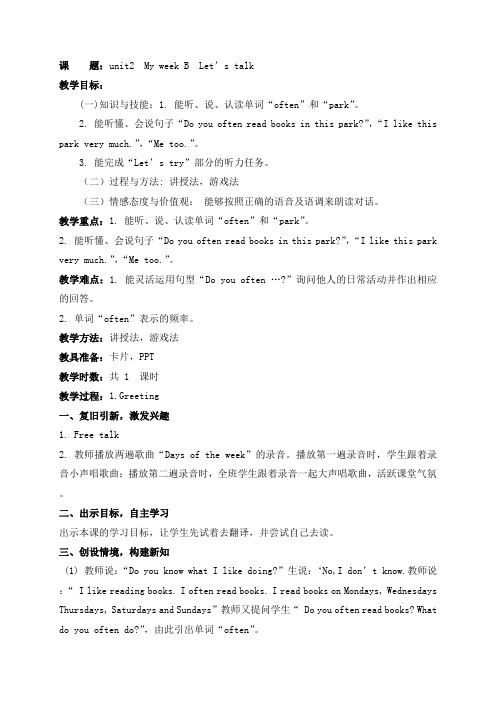
课题:unit2 My week B Let’s talk教学目标:(一)知识与技能:1. 能听、说、认读单词“often”和“park”。
2. 能听懂、会说句子“Do you often read books in this park?”,“I like this park very much.”,“Me too.”。
3. 能完成“Let’s try”部分的听力任务。
(二)过程与方法: 讲授法,游戏法(三)情感态度与价值观:能够按照正确的语音及语调来朗读对话。
教学重点:1. 能听、说、认读单词“often”和“park”。
2. 能听懂、会说句子“Do you often read books in this park?”,“I like this park very much.”,“Me too.”。
教学难点:1. 能灵活运用句型“Do you often …?”询问他人的日常活动并作出相应的回答。
2. 单词“often”表示的频率。
教学方法:讲授法,游戏法教具准备:卡片,PPT教学时数:共 1 课时教学过程:1.Greeting一、复旧引新,激发兴趣1. Free talk2. 教师播放两遍歌曲“Days of the week”的录音。
播放第一遍录音时,学生跟着录音小声唱歌曲;播放第二遍录音时,全班学生跟着录音一起大声唱歌曲,活跃课堂气氛。
二、出示目标,自主学习出示本课的学习目标,让学生先试着去翻译,并尝试自己去读。
三、创设情境,构建新知(1) 教师说:“Do you know what I like doing?”生说:‘No,I don’t know.教师说:“ I like reading books. I often read books. I read books on Mondays, Wednesdays Thursdays, Saturdays and Sundays”教师又提问学生“ Do you often read books? What do you often do?”,由此引出单词“often”。
